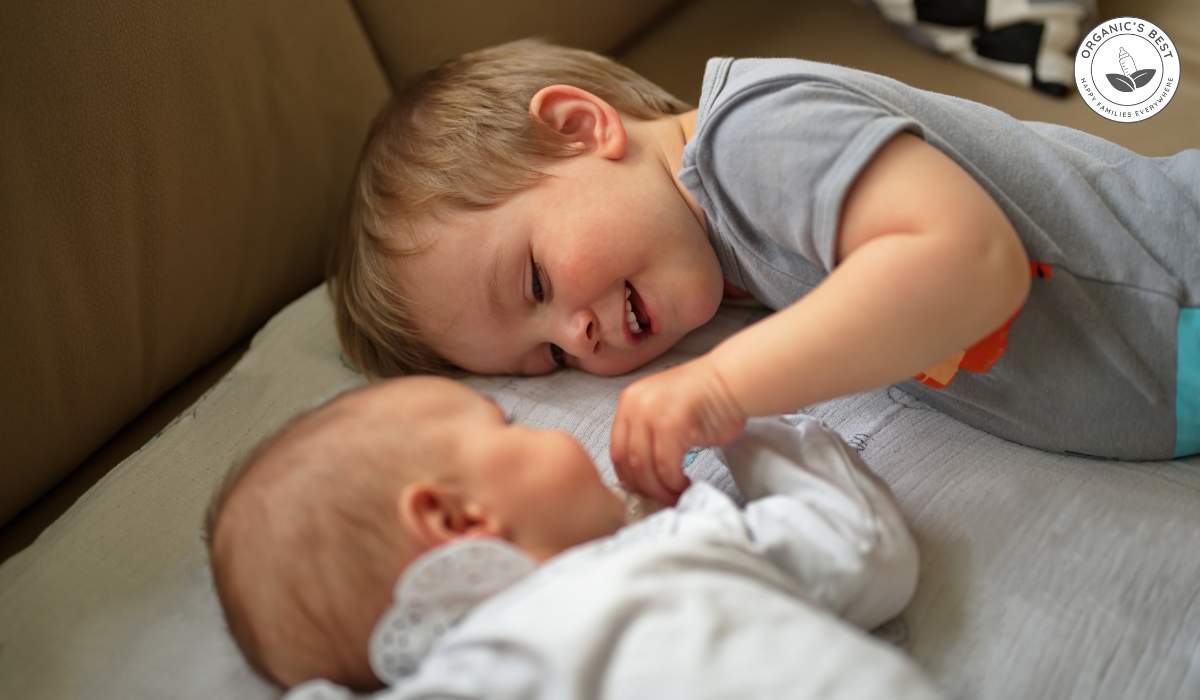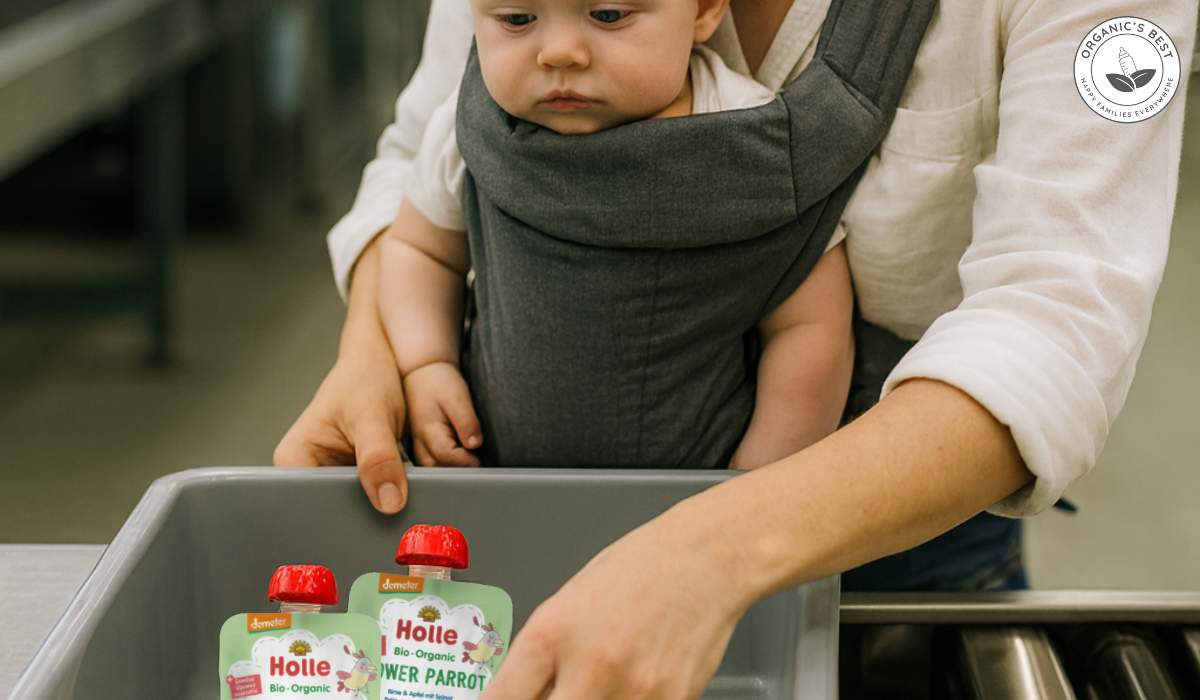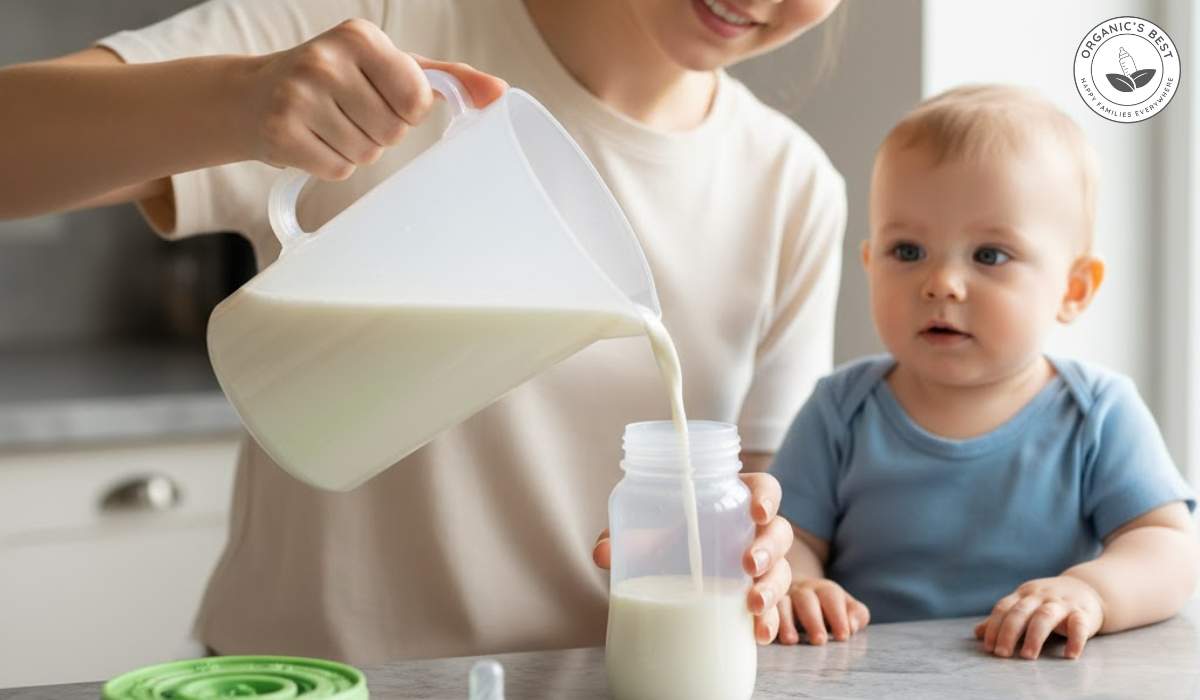Click to Get 2 FREE Boxes/Cans
Click to Get 2 FREE Boxes/Cans
Only New Customers! Click HERE to Get 2 Extra Boxes/Cans for Free With Your First Order.
Only New Customers! Click HERE to Get 2 Extra Boxes/Cans for Free With Your First Order.
BABY FORMULA
Offering new parents top-quality European infant formula from renowned brands like HiPP, Holle, Kendamil, and more. If you’re uncertain about which product to choose, our Formula Finder can help you make the best decision for your baby.
Baby Food
Offering new parents a premium selection of European baby foods, including jars, pouches, cereals, and snacks from esteemed brands like HiPP and Holle.
How to Introduce Toddler to New Baby: Tips for Easing Jealousy and Building Bond
by Agustina Fernandez November 11, 2025 8 min read

Your family is growing! Welcoming a second child is such an exciting milestone, but it can also bring some big emotions for your firstborn.
As your toddler learns what it means to be a big brother or sister, feelings of jealousy are completely normal. After all, that tiny new baby suddenly takes up a lot of mom and dad's time.
As your toddler adjusts to the new normal, your two little ones will likely become best friends, playing together, sharing snacks, and creating lifelong memories, but the early days can be an adjustment for everyone.
If you anticipate these challenges, preparing in advance can make a world of difference. By setting the stage early, building new routines, and creating healthy ways to manage big feelings, you can make the transition smoother.
We are here to offer support by giving you tips on how to help toddlers adjust to a new baby.
Table of Contents
- Introducing Toddler to Newborn
- How to Prepare Toddler for New Baby
- Why Toddlers Struggle with a New Sibling?
- Signs Toddler is Jealous of New Baby
- Handling Your Toddler Jealous of Baby and Behavioural Changes
- How Long for Toddler to Adjust to New Baby?
- Final Thought: How to Help Toddlers Adjust to Newborn
Introducing Toddler to Newborn
Bringing home a new baby is one of life's most rewarding transitions, but for your toddler, it can feel like their whole world just shifted because of their new sibling. The arrival of a new baby means sharing attention, space, and routines that once revolved entirely around them.
While this can be challenging at first, with enough preparation and reassurance, the experience can ultimately strengthen your family bond and help your toddler practice empathy, patience, and love.
It's important to remember that regression is completely normal when toddlers adjust to a new baby. Developmentally, toddlers often thrive on consistency and predictability. When a new baby arrives, that structure can shift overnight. Offering comfort, extra cuddles, and patience helps them feel secure during this transition.
Additionally, involving your firstborn in preparation for their new sibling's arrival can help them understand what's coming. This can look like engaging in age-appropriate conversations, books, and pretend play.
It can also look like asking them to help choose the baby's blanket, pick out a onesie, or decorate the nursery. Even small tasks, like putting a stuffed animal in the crib or packing the hospital bag, can make a big difference.
When the baby finally arrives, it helps to set up a few moments of special connection with your toddler each day. For example, ask them if they'd like to hand you a diaper while you're changing your little one, or ask them to sing a song to the baby. Make sure that in these precious moments, you are praising their effort, no matter how big or small.
Finally, make sure your toddler still gets one-on-one time with you, even if it's just 10 minutes of reading together or going for a short walk. That undivided attention helps balance the sudden change in focus that a newborn naturally brings.
Over time, new routines will form, and your toddler will get used to the new family dynamic!
How to Prepare Toddler for New Baby
As mentioned above, preparation is key. While surprises can be exciting, can you imagine one day just having a new sibling out of the blue! Just like parents, toddlers need some time to mentally prepare for the arrival, and there are important steps to take before and after the baby arrives to help your child process the idea and feel included in this exciting change.
Preparing Older Children Before the Baby Arrives
Here are some ways to prepare your child for their new sibling's arrival.

Speak Positively: Start by introducing the idea of a new baby in simple, positive language. Explain that the baby will be tiny, sleep a lot, and need extra care at first. Avoid framing the baby as a competitor for attention. Instead, emphasize that the new baby is an addition to the love already in your family.
Explore Big Sibling Stories: Children learn best through stories. There are many picture books and gentle shows that explore the idea of becoming a big sibling. Reading these together can open up natural conversations about what your toddler might expect, how babies behave, and what it means to be a helper. Seeing characters they relate to go through the same experience helps normalize the change and gives them a framework for their own emotions.
Involve in Baby Preparations: Let your toddler feel like part of the process by asking their opinion on nursery colours, or let them pick a small toy or outfit for the baby. They can even help set up the crib or pack the diaper bag.
Talk Openly About Feelings: Big changes often bring big feelings! Encourage your toddler to share what they think or worry about, and validate those emotions. You might say, "It sounds like you're a little nervous about the baby. That's okay, change can feel strange sometimes." When children feel heard and understood, they're better able to manage their emotions and adapt to new dynamics.
Helping Your Toddler Adjust After the Baby Is Born
Once your new baby is here, these tips can help soothe the transition from the first meeting and beyond.
Introduce Them to the Baby with Care: When your toddler meets their new sibling, make it a calm, positive experience. The best way to introduce toddlers to new babies is to let them approach at their own pace. You could even have a "gift" from the baby waiting for them, something small that reinforces the idea that this new relationship is special.
Make Special One-on-One Time for Your Toddler: Your attention will naturally be divided after birth, but carving out even 10 minutes of undivided time each day just for your toddler can make a big difference. Read together, take a short walk, or snuggle before bed.
Encourage Helping, But Don't Force It: Invite your toddler to help in simple ways, like passing a diaper, singing softly, or patting the baby's back. Praise their efforts and show appreciation for their "big sibling" role, but avoid pressuring them to participate if they're not ready.
Creating a Smooth Daily Routine
After the initial introduction, it's time to get your toddler used to their new routine. Here are some ways to make the transition go smoothly.
Keep Familiar Routines to Provide Stability: As much as possible, maintain your toddler's usual routines around meals, naps, and bedtime. Consistency offers a sense of safety when everything else feels new.
Balance Attention Between Toddler and Baby: It's easy for newborn care to take over your days, but try to balance moments of attention between both children. Enlist your partner, grandparents, or close friends to spend time with your toddler when you're occupied with the baby.
Include Your Toddler in Newborn Tasks: Give your toddler a few "big sibling jobs" that make them feel proud and needed.
Why Toddlers Struggle with a New Sibling?
To some parents, it may seem like toddlers adjusting to new babies should be easier. After all, they are gaining a new lifelong friend; however, that's not always how they see it, and some parents even notice their toddler acting out after a new baby's arrival.
That's because from a toddler's perspective, the arrival of a new baby can feel confusing and even a little threatening. Until now, they've been the center of your world, with every cuddle, bedtime story, and meal revolving around them.
Suddenly, a tiny newcomer, whom they've never met before, requires constant attention, and routines that once felt predictable shift overnight. Toddlers don't yet have the emotional vocabulary to express their frustration or confusion, so they might act out instead.
Another factor is where toddlers are developmentally, especially because they are in the early stages of forming their sense of identity and independence. When a new baby arrives, it can feel like there's a sense of control being taken away. They might not understand why Mom can't pick them up as easily or why the baby gets fed first.
It's not that they don't love their new sibling, it's that they're still learning how to process big emotions like jealousy and sadness. In moments of conflict between siblings, parents should aim to offer their toddler empathy rather than frustration as much as possible.
Signs Toddler is Jealous of New Baby
Jealousy can show up in many forms, and some are more subtle than others. Common signs include:

-
Regression: Wanting to use a bottle, wear diapers again, or be carried like a baby.
-
Tantrums or mood swings: Increased crying, anger, or frustration over small things.
-
Clinginess: Wanting extra attention, refusing to let you out of sight, or becoming more possessive of you.
-
Sleep or eating changes: Disrupted sleep schedules or changes in appetite.
-
Acting out: Hitting, yelling, or showing aggression toward the baby or parents.
-
Withdrawal: Being unusually quiet, distant, or uninterested in activities they used to enjoy.
These behaviours are normal and should be temporary. They are just a toddler's way of expressing their feelings without having the language skills to do so yet.
Handling Your Toddler Jealous of Baby and Behavioural Changes
The best way to handle jealousy is with patience and consistency. Start by acknowledging your toddler's feelings rather than dismissing them. Here are some ways to keep jealousy over a new sibling at bay.
-
Offer extra attention when possible. Even short bursts of undivided time, like a quick game or a walk, can fill your toddler's emotional cup.
-
Maintain familiar routines. Keep bedtime rituals, favourite snacks, and daily rhythms as consistent as possible.
-
Involve them in baby care. Let your toddler help hand you a diaper or sing a lullaby. Praising their help fosters pride rather than competition.
-
Avoid comparisons. Try not to say things like "The baby doesn't cry that much" or "You're a big kid now." Instead, emphasize their unique strengths: "You're such a great helper," or "The baby is lucky to have you."
-
Keep expectations realistic. Regression and mood changes are part of the adjustment process. Consistency, reassurance, and affection will help your toddler find their footing again.
How Long for Toddler to Adjust to New Baby?

Every child is different, but most toddlers take a few weeks to a few months to fully adjust to life with a new sibling. The first month is often the hardest as your toddler learns to share attention and navigate new routines. Around the three- to six-month mark, many children begin to settle into their role as a big sibling, especially once the baby becomes more interactive and starts smiling or responding to them.
That said, if these behavioural changes persist or seem unusually intense, it's a good idea to reach out to your pediatrician. They can help assess what's going on, offer advice on how to help toddlers adjust to new babies, and connect you with the right support or specialists to address any underlying issues early on.
Final Thought: How to Help Toddlers Adjust to Newborn
Bringing home a new baby is a big transition for everyone, but especially for your toddler, who's still figuring out their place in the world. The most powerful thing you can do is offer empathy, patience, and reassurance. Remind your toddler often that your love hasn't changed, your heart has simply grown bigger to fit two little ones instead of one.
Celebrate small victories, give grace for tough days, and find moments of connection for the whole family amid the chaos. With time, your toddler will not only adjust but thrive in their new role. Those early feelings of jealousy and confusion will give way to laughter, teamwork, and sibling bonds that last a lifetime.
|
Disclaimer: Please be aware that this information is based on general trends in babies, and it is not medical advice. Your doctor should be your first source of information and advice when considering any changes to your child’s formula and when choosing your child’s formula. Always consult your pediatrician before making any decisions about your child’s diet or if you notice any changes in your child. Breastfeeding is the best nutrition for your baby because breast milk provides your child with all the essential nutrients they need for growth and development. Please consult your pediatrician if your child requires supplemental feeding. |
Agustina Fernandez
Dr. Agustina Fernandez earned her medical degree from the prestigious Universidad Nacional de Córdoba, Argentina. With a deep-rooted passion for pediatrics, Dr. Fernandez is currently on the path to specializing in children's healthcare. Recently, she has delved into the vital field of infant nutrition. Her research interests include breastfeeding, infant formula, and baby food in little ones’ formative years. Dr. Fernandez's commitment to this area of study underscores her dedication to ensuring the health and well-being of children from their earliest days.
Leave a comment
Comments will be approved before showing up.
Also in Organic Infant Nutrition and Health Blog

Everything You Need To Know About Winter Pregnancy: Essential Tips for Moms-to-be
by Agustina Fernandez December 16, 2025 8 min read
Read More
Can You Bring Baby Food Pouches on a Plane? Essential Tips for Parents
by Agustina Fernandez December 09, 2025 7 min read
Read More
The Formula Pitcher: Is It Safe To Make A Whole Pitcher Of Baby Formula?
by Agustina Fernandez December 02, 2025 8 min read
Read More